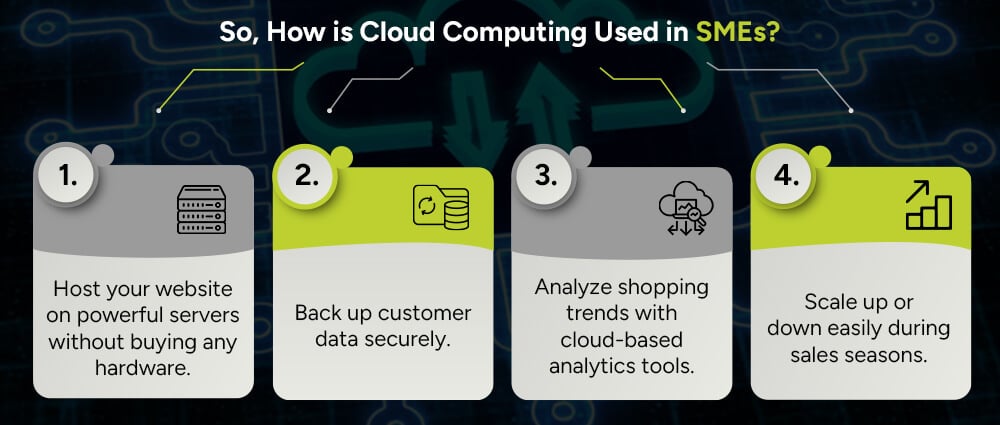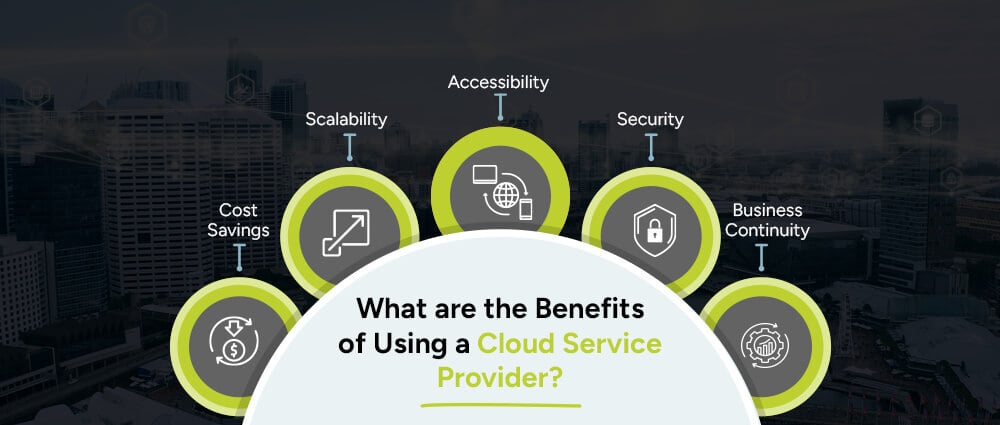If you’re running a small or medium-sized business (SME), you’re probably also getting ready to integrate cloud computing, and for good reason. The cloud isn’t just for big tech companies anymore. It has become an innovator in the smaller business industry as well, who are looking to grow without burning a hole in their budget.
But with so many options out there, it’s normal to ask: How to Choose a Cloud Service Provider? Let’s break it all down in a simple, conversational way.
A cloud service provider, commonly known as a cloud provider for short, is a company that offers services like cloud storage, computing power, and internet networking. Instead of buying expensive servers or software outright, you can effortlessly pay a subscription or usage-based fee to use their resources, enabling you to focus on the core areas of your business, whether its healthcare cloud migration, retail, or real estate, you can leave the IT infrastructure to the expert teams.
Amazon Web Services, or AWS, is perhaps the best-known of the big names in the cloud today. Then, of course, there is Microsoft Azure, along with Google Cloud, as the next-most-important players in the game. They are, however, not alone in this field; another host of providers with the benefits, prices, and services unique to them. All in all, to use those big providers, you still require a cloud service provider to take care of all your infrastructure needs properly.
Let’s say you run an online clothing store. With the role of cloud managed services, you can:

From file sharing and storage to collaboration tools and data security, the cloud covers it all.

Some of the advantages that small and medium-sized businesses attain with the help of using a cloud service provider are as follows:
It’s a one-time investment. Once you get over that, you’ll gradually start to realize how you are saving costs in the long run. With no need for expensive hardware or IT staff, you are able to add more money towards your business and still have easy access to all of your data.
When you’re operating a small or medium-sized business, you never know when you’ll need to scale up or scale down. Cloud service providers offer you that extra bandwidth to help you meet your business demands and requirements almost instantly.
Start small and scale as you grow.
When your business is just starting out, you don’t always have an office to operate from, forcing you to manage your team remotely. With a cloud service, you have easy access to all your files in one location, and your teams don’t need to be in one place to search for files. All they need is a good internet connection, and they’re ready to work from anywhere at any time.
One of the best advantages of a cloud service is that you don’t have to worry about any kind of malicious activities or security breaches. Most cloud solutions meticulously monitor all activity using high-level encryption methods that ensure no unwanted accidents can ever occur.
One: Cloud platforms offer performance analytics that let you understand your consumer base better and identify all common patterns to help you improve. Two: cloud backups store all your information that you will require if you ever face disasters and need to recover quickly.
So, to summarize, cloud services help SMEs stay agile, secure, and competitive.
Now, let’s get to the main question: How to choose a cloud service provider? Here are a few things to consider:
Start by identifying what you actually need. Do you just need storage? Or do you want full-blown cloud infrastructure management for running applications? The clearer you are, the easier it’ll be to shortlist the right cloud service providers.
Now, look for the services offered and the service you require. Most providers offer a wide range of services that include the following:
In IaaS, physical or virtual servers, storage, and network infrastructure are rented. This allows companies to host their data and applications.
In this type of service, a platform is provided for developing and launching applications. This includes processing tools and data storage.
SaaS includes the utilization of software apps that are hosted by the service provider. These software applications can be accessed by users all over the world.
In FaaS, the cloud provider handles all server-side management, the developers build and run the applications as individual functions.
Now, align your requirements with the type of workload your providers offer and choose the best one for your business.
You want a provider that guarantees at least 99.9% uptime. Downtime means lost customers and revenue. Check their track record and service level agreements (SLAs). You need a service provider with a good record of uptime and reliability.
When picking a cloud service provider, go for one that has a solid setup and backup systems in place, as this helps avoid downtime. It’s also smart to check if they’ve had any outages in the past and how they dealt with them.
But uptime isn’t the only thing that matters. You should also think about how fast and well their services work overall. A trustworthy cloud provider keeps your data and apps ready and available whenever you need them.
Security poses grave challenges for many organizations, and therefore, choosing a cloud service provider that considers security as a primary factor is very important. It should employ robust security tools: data encryption, access control for secure operations, and regular security audits and tests. These features not only protect your data but also pose great opportunities in the field of cybersecurity, particularly for professionals on a global scale.
It’s also a good idea to choose a provider that follows industry rules and standards, like HIPAA compliant cloud storage or PCI DSS, depending on your field.
Plus, make sure you understand how the provider handles security incidents and data recovery, basically, what they’ll do if something goes wrong.
On top of that, cloud cryptography often offer asset tracking and protection through things like encryption, access limits, frequent backups, and monitoring for any suspicious activity.
When selecting a cloud service provider, scalability is one of the most important considerations since it allows increased or decreased use of any cloud resources as required by the organization at any point in time. This means that it can be called upon significantly when anticipating growth or if demand is likely to vary at any time during the year.
A good cloud consulting company should ease up overstretched budgets while adding new storage space, ramping up computing power, and turning them down when things slow down.
More importantly, however, is the fact that it saves costs since you only pay for what you actually use, freeing you from having a fixed setup that is not always going to fit your needs.
Tech issues happen. There must be a backup support team to turn to when running or storing important data in the cloud.
Check on the types of support offered by the provider like: full 24/7 support, multiple contacts like phone, email or even chat, etc. It always helps to check the reputation of a particular service regarding such things by checking reviews or ratings online. You will find all that soul-soothing peace of mind associated with opting for such great customer support when you choose a cloud provider.
With regard to pricing of services, cloud computing can bring you savings as compared to traditional IT setups. Before you sign a contract with any one provider, be sure to know all the details about pricing.
Some are very strict about pay-as-you-go pricing, meaning you pay only for what you use; others usually work out a fixed monthly price or a hybrid of the two. Make an effort to find price comparisons from different providers and see what is really included-support, maintenance, or some additional functions.
Check as well if long-term contracts are mandatory toward the provider or if there are possibilities for price adjustments in the future. By knowing all potential cloud cost optimizations in advance, you would be able to select a plan that matches your budget, thus avoiding any unwanted surprises later on.
Check whether your potential provider is able to seamlessly blend in-and-integrate with your current workflow, regardless of whether you’re using Microsoft 365, Slack, or QuickBooks. Think of how much retuning or reprogramming you need to correct in order to get your applications to work on this platform if your tools or technologies do not match.
Many providers provide useful migration services and help you plan the migration to cloud architecture well. Understand clearly exactly what sort of support these will offer and then compare that to your project needs. It helps you make the decision on who does what during website migration to Cloud. In some cases, their technical experts can step in to help fill any skill gaps on your team.
Of course, some of the bigger public cloud providers may not offer much in hands-on support. So, in those cases, you might need help from a good cloud integrating software company.
Here are a few top picks (with their standout features):
Choosing the right cloud provider doesn’t have to be intimidating. By knowing your business needs and asking the right questions, you can find a partner that grows with you.
Remember: How to pick a cloud service provider is less about finding the “best” one in general, and more about finding the best fit for your business.
If you’re still unsure, start small, test things out, and scale from there, and don’t hesitate to consult with Arpatech‘s finest cloud consultant to get your query solved in minutes and learn how to choose a Cloud Service provider.
Yes and no. Using multiple providers (called multi-cloud) can reduce risk and increase flexibility. But it also adds complexity. For SMEs, it’s usually best to start with one reliable provider and expand later if needed.